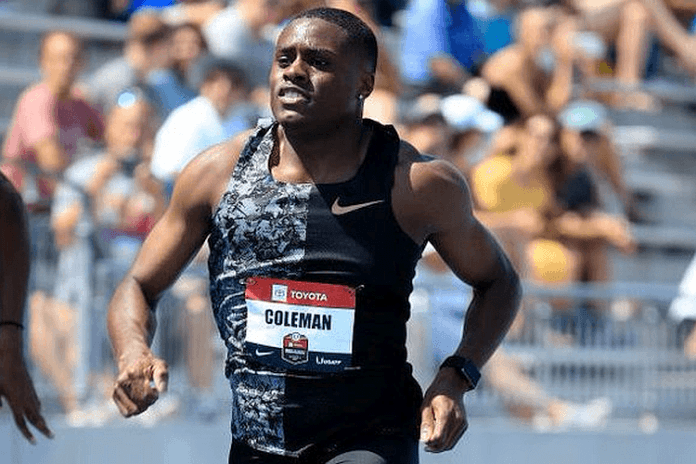“USADA announced today that its has withdrawn its charge that USA Track & Field athlete Christian Coleman committed a violation of the whereabouts rules after receiving guidance from the World Anti-Doping Agency (WADA) …”
With that statement, the U.S. Anti-Doping Agency removed the cloud hanging over world 100 m leader Coleman of the U.S. and has cleared his way to competing in the IAAF World Championships at the end of this month.
What happened? It’s technical, but here it is:
● Coleman was charged with “whereabouts failure” – not reporting where he was if different from his quarterly filing – on 6 June 2018, 16 January 2019 and 26 April 2019.
● That’s three filing failures within 11 months, grounds for reporting an anti-doping violations, suitable for a suspension. The USADA made such a report and Coleman asked for an expedited hearing on 4 September.
● Coleman’s contention was that the missed 6 June 2018 filing – where a Doping Control Officer was present to take a sample, but Coleman was not where he was supposed to be – had to be charged as a failure on 1 April 2018, based on the rules of the World Anti-Doping Agency. That would stretch his three “whereabouts failures” beyond the 12-month period used for assessing penalties.
● “USADA consulted with WADA to receive an official interpretation of the relevant Comment in the [International Standard for Testing and Investigations]. This interpretation was received on Friday, August 30, 2019, and was that the Filing Failure which USADA had recorded in June 2018, should relate back to April 1, 2018, the first day of the quarter in which the failure to update occurred.”
● Thus, USADA has withdrawn its complaint, but the case could be taken up by the IAAF’s Athletics Integrity Unit or WADA itself.
The USADA also noted that “In 2018-19, Coleman he has provided his Whereabouts information by the start of each quarter and has been tested by USADA on 20 separate occasions.”
That’s a lot of testing, but Coleman escaped his sloppy filing practices on a technicality. But rules are rules and USADA hardly decided to let the case slip, having asked WADA for its view on the rule involved.
It’s also noteworthy that Coleman has been tested 20 times by USADA in 20 months, and certainly more by others in international competitions. And he will be tested again – multiple times, no doubt – before and during the Worlds on Doha.
¶
The African Games have concluded in Rabat (MAR), and while no new world-leading marks were reported, there was some important action there:
● Nigeria’s Raymond Ekevwo runs for the University of Florida and started the year with a 100 m best of 10.35. He ran 10.28 at the Florida Relays and then suddenly improved to 10.02 for second at the SEC Championships, but failed to get out of the NCAA East Regional.
Now he shows up at the African Games and runs 10.20, 10.26 and 9.96 (!) to win the 100 m and is suddenly (?) a contender for honors at the World Championships. He beat Arthur Cisse (CIV), who ran 9.97 and fellow Nigerian Usheoritse Itsekiri (10.02).
● In the women’s sprints, Cote d’Ivoire’s Marie-Josee Ta Lou won the 100 m in 11.09 as expected, but what about Gina Bass from Gambia in second in 11.13 (national record)? Bass then won the 200 m in 22.58, with Ta Lou third! Another one to watch on Doha.
Steeplechase fans will note that Kenya’s Ben Kigen won in 8:12.39 over Getnet Wale (ETH: 8:14.06) and Morocco’s own Soufiane El Bakkali (8:19.45).
¶
The outstanding Athletics International newsletter (inquiries here) carried this note, reprinted in its entirety:
“A final year student at the University of Montana has pbs of 1:55.23 for 800m, 3:50.19 for 1500m and 14:38.80 for 5000m. What’s so significant about that? Because the runner in question, now going under the name of June Eastwood, is transgender who has recently transitioned to female and undergone testosterone suppression treatment. If she, formerly a member of the university men’s team, reproduces times anything like those it will rock the sport to its foundations. From being an unexceptional male runner she would instantly become one of the world’s elite. That 1500m mark is just 0.12 outside Genzene Dibaba’s world record while the 800m time is less than a second away from Caster Semenya’s best. Alarm bells are ringing.”
As Jonathan Eastwood, he placed seventh in the 2018 Big Sky 1,500 m and 12th in 2017. He had a best of 4:22.66 for the mile indoors in 2016, when he placed ninth in the Big Sky Indoor Championships.
The conventional thinking is that the IAAF’s female-eligibility regulations would be about Semenya and Francine Niyonsaba (BDI). But this may be the real test, especially at 5,000 m, where the IAAF’s regulations do not apply – only from 400 m to the mile – and the question of transgender performance is largely unknown.
Eastwood – now a redshirt senior at Montana – competed last Saturday in women’s cross country at the Clash of the Inland Northwest meet, finishing seventh in 14:33.0 over 4 km. So let’s hold back on the bells right now, but stay tuned.




























